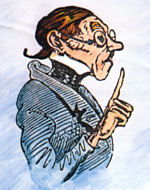Courses/Resources
about 20th century/post-1945 Germany
(back to top)
(link updated 1/2/11)
Explore some of these on-line courses to see how other
instructors structure their courses, and what readings they use.
- You can also search Johns Hopkins' American Institute of
Contemporary German Studies'
database of syllabi on German history (collected 1992-1996)
by keyword and author.
[note 11/17/06:
AICGS took this off line after Feb. 2006. The database can still be
accessed through the web archive, www.archive.org,
by entering the URL. I've updated the bold URL, above, to link to
a 2005 version; or see the list
of archived versions; the links below go directly to a June 2005
version.]
- [projected completion: Aug. 2006:] German
History in Documents and Images, web archive by the German
Historical Institute in Washington, D.C. This is an excellent
database of images and documents, in German and English, with introductory
essays.
- "Germany since 1945: Building Democracy
after Dictatorship," this is my own course, last taught in
Winter 2006 by Harold Marcuse, at the University of California,
Santa Barbara.
- "Revisiting
the 1970s: Radical Politics, Gender Trouble, and Pop Culture in East
and West Germany," Fall 2005 by Susan Cocalis, UMass.
Includes interesting films, lecture notes, readings (Böll, Katarina
Blum; Plenzdorf, Sufferings Young W.; Jelinek, Women
as Lovers).
- "Germany
from Unification to Reunification," Fall 2004 by William
Patch, Grinnell. Has image galleries, a reading list, and
useful handouts. Uses Blackbourn's Long 19th, Kelly (ed.)
Workers' Autobiographies, Nicholls Weimar, Allen
Nazi Seizure, Kershaw Hitler (1991), Browning Ordinary
Men, Moeller Motherhood, and Böll Billiards.
- "Nazi
Germany and the Holocaust," Fall 2004 by David Ciarlo,
MIT. Uses Spielvogel textbook and an interesting selection
of primary sources and essays. Assignments page also of interest.
- "Germany
Since 1870," Spring 2004 by Douglas Skopp, SUNY Plattsburgh.
Uses Fulbrook's textbook for 20th C., Retellack and Chickering for
Kaiserreich, Kershaw and Stibbe for Nazism. Nicely formatted with
coherent policies.
- "German
Cultural History, 1800-1989," Spring 2004 by Susan
Crane, University of Arizona. Uses Elon,
Mosse, Ekstein, Kershaw and a reader (table of contents appended).
- "Germany
in the 20th Century," taught in Spring 2003 by William
Mood for the University of Maryland's Europe campus,
uses Fulbrook's textbook, and offers some good links (esp. to the
Foreign Relations of the United States documents; link).
- "Interpreting Nazi Germany since 1945" is the final 3-week
unit of Kansas State Univ. Prof. Brent
Maner's Fall 2004 "The
Rise and Fall of Nazi Germany" course. He also teaches a
"Europe since World War II" course in which students read
Schneider's The Wall Jumper.
- "German
Culture and Civilization of the 20th Century," a spring 2002
course by Gabriele Dillmann at Denison Univ. in Ohio,
spent lots of time on the post-1945 period, and used The Wall
Jumper.
- "Germany in
20th Century" (Fall 2004) and "Germany
Since Hitler, 1933-present" (Spring 2004), by David
Crew at the University of Texas, Austin. Uses Fulbrook, Schneider's
Wall Jumper, also Garton Ash's The File and Daphne
Berdahl (UCSB student
review).
- "Germany
in the Twentieth Century," Fall 2001 by David Denis
at Loyola Univ. in Chicago, used two books by Schneider.
He has has Orlow reading notes for the post-45 period (link).
He also has a syllabus for a "Europe,
1945-present" course.
- "Germany
from Dictatorship to Democracy," and "Germany
from Metternich to Hitler," by Noel
Cary at Holy Cross College in Worcester,
Mass. Very detailed and rigorous courses with on-line syllabi, with
assignments. Also uses Fulbrook as main textbook. (2001 or later)
- "Germany
since 1848," Fall 1998 by Daniel Rogers, University
of South Alabama. Uses Herwigs Hammer or Anvil?.
- "German
History 1890-1990," Spring 2000 by Maria Höhn,
Vassar college, uses Orlow's History of Modern Germany,
Crew (ed.), Allen, Hegi. Detailed breakdown of lecture topics
and assignments; links (probably outdated).
- "Germany
in the Twentieth Century," taught in Fall 1999 by Cynthia
Paces at The College of New Jersey, used Fulbrook's textbook.
- "History
of Germany since 1914," by David Tompkins, Rutgers
University, uses Fulbrook, Christa Wolf, What Remains
(Chicago, 1995)
- "German
Women in the 20th Century" was the title of a 1995 seminar
by Patricia Mazon. Its syllabus is archived at the AICGS at John's
Hopkins.
- "The
Emergence of Modern Germany 1871- 1990", a 2004 distance
education course taught by Mary (?) at the Open University
of Guelph uses Dietrich Orlow's textbook, and Maria Hohn's
GIs and Frauleins: the German-American Encounter in 1950s West
Germany (UNC 2002) for the post-1945 period (textbook
list).
- "Modern
Germany," by Gerhard Rempel, history, Western New England
College: a hyperlinked site with lecture
texts (#35-52 on post-1945) and a maps
page.
- "Hitler's
Germany," a fall 2001 course covering the period 1870 to
1989, by Thomas Saylor at Concordia Univ. in St. Paul, Minnesota,
uses Peter Alter's German Question and Europe for the post-1945
period.
- "Literature
and Culture in Germany after 1945" was offered in summer
2003 by an international institute at the University of Bayreuth
in Germany.
- "Introduction to German History and Culture," taught in
fall 2003 by William
Rollins at the University of Canterbury, looked briefly
at the post-1945 period. (scroll down and click on German 113)
- "Modern Germany" (.doc only) by Jay
Geller at the University of Tulsa, Oklahoma. Has some
multimedia
sources.
- Nov. 2004 H-German discussion about readings & films
on Germany memory after 1945: question,
8
responses (including mine), 4
more responses, 2
more. They recommend: Frei, Nivens, articles by Domanski, Moeller,
Luedtke; chapters from Ladd, Koshar, novel by Schlink, films Nasty
Girl, Murderers Among Us, Germany, Pale Mother,
Sebald, Ryback, Rosmus, Henisch, Sichrovsky, Lebert. (see a UCSB
student's review of Lebert)
- Winners of Feb.
2006 H-German competition for best syllabi; includes
links to versions of all submitted syllabi.
|
